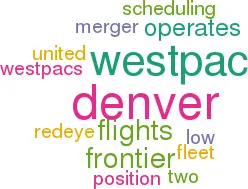A question of scheduling philosophy
November 1997


An apparently ideal merger between two US low cost start–ups — Western Pacific and Frontier Airlines — failed in October, precipitating WestPac’s Chapter 11 bankruptcy (losses totalled $35m on $79.5m of revenues in the first half of the year) and causing the resignation of four key board members. The reasons given for the failure of the merger were different corporate cultures, which is usually inevitable, and differences in scheduling philosophy. What does this mean?
In the summer WestPac moved from its original base in Colorado Springs (about 100km from Denver) to Denver International, the super airport opened in 1995, which is dominated by United with competition coming from new entrant Frontier Airlines.
Acquiring Frontier’s Denver position appeared to be the logical way of quickly gaining mass and most importantly building network connectivity. Frontier operates a fleet of a fleet of 13 737s while WestPac’s fleet has built up to 22 737s. Acquiring Frontier would have eliminated a product that was too similar to WestPac’s. Denver may be big enough to support one low cost low frill airline — or even two well financed ones — but two weak competitors would have to fight each other as well as United.
Both Frontier and WestPac operate a hub–and- spoke network. However, WestPac has focused on aircraft utilisation at the expense of preferable arrival and departure times.
This appears to have been an attempt to prevent an increase in unit costs following the move from Colorado Springs.
This strategy resulted in some peculiar scheduling. For example, WestPac operates a bank of red–eye flights from Denver to the East leaving Denver at 1am and arriving in the eastern US at 6am. Red–eye flights are common from points in California where a 10pm departure results in a 6am arrival on the opposite coast. But Denver’s mid–continent position makes this type of flying unattractive due to the post midnight check–in time.
WestPac also operates a bank of flights from Denver to the west at 11:45pm. These arrive in California between 1–2am, which is unheard of. United operates more than 400 daily flights from Denver with no departures after 10pm.
WestPac may have found a unique time channel to offer some of their flights but with very questionable consumer demand.
Frontier’s position on schedules became clear a few days after the merger was cancelled when it eliminated its red–eye flight from Denver to Boston. Their press release contained a statement, clearly directed at WestPac, indicating they were leaving in place one daily high–demand flight which more closely matched capacity to the consumer demand.
WestPac is now looking for new financing.